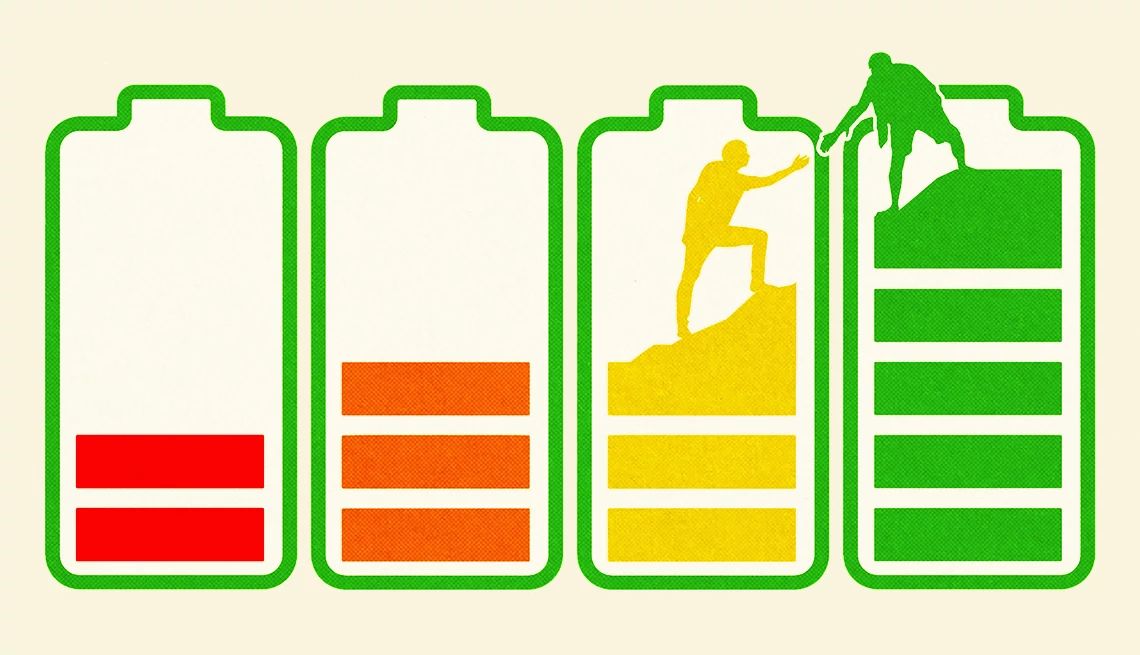2. Suss out sleep struggles
With age, sleep isn’t as deep, long or consolidated, says Aric Prather, a professor of psychiatry and behavioral sciences at the University of California, San Francisco, and author of The Sleep Prescription. “Sleep lives in the brain. Like everything else, our brain ages,” he says, which may be why we see sleep change in the fifth decade of life and beyond. These changes can make sleep feel less restorative — and there’s evidence that sleep loss may also accelerate cellular aging.
Your move: If you feel run-down during the day despite being in bed for seven-plus hours a night, you need to rule out any relevant medical conditions or disorders, like obstructive sleep apnea, Prather says. Medications can also interfere with sleep or cause daytime drowsiness, so ask your doctor if you should take your pills at different times of day or before bed. Avoid dozing or catnapping by structuring your day with planned activities. This allows sleep to be pushed into the night, where it can get to work on cellular repair and regeneration.
3. Narrow your eating window
Too much food is an “energetic burden” to the body, says Picard, since it has to expend energy to handle additional calories. “Eating more doesn’t give you more energy, it actually steals your energy,” he says.
Intermittent fasting (IF), which essentially means putting guardrails around the time you eat, has two main benefits. One, restricting eating to an eight-hour window tends to reduce your daily intake of calories. Two, IF improves autophagy — the process by which cells clear out trash, like free radicals. “Intermittent fasting activates autophagy to bring cellular balance back to health by getting rid of damaged mitochondria,” explains Rajat Singh, M.D., a professor of medicine and director of the Comprehensive Liver Research Center at UCLA.
Your move: Research suggests there are benefits to a 16-to-8 IF schedule, where you fast for 16 hours and eat within an eight-hour window. However, long-term IF isn’t sustainable for everyone, especially older adults. For best results, find a fasting period that works for you and that you can stick with, says Singh. (And, of course, get clearance from your doctor first.) Maybe that’s 12 hours of fasting — from 7 p.m. to 7 a.m., for example — coupled with regular exercise. The key is consistency.
4. Talk to more people
You know how being stressed and overwhelmed can lead to feeling fatigued? That’s evidence that your state of mind is affecting your mitochondria, says Picard.
“People who feel more positive about life have more mitochondria with greater capacity for energy transformation than people who have no purpose and fewer positive life experiences,” he says. Positive states of mind may increase biological energy through the mitochondria, helping you feel more alive.
Your move: Just eight hours of solitude can be enough to drag down your energy. Call a friend, send your kids a text, get together to play cards. “These are all things that keep brain and muscle networks active to diminish the hallmarks of aging,” says Christiaan Leeuwenburgh, a professor at the University of Florida’s Institute on Aging. Focus on new activities and breaking routines. Ask a friend or neighbor what they’re doing tomorrow — and don’t hesitate to ask if you can join them.

